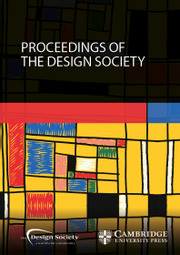Article contents
AN ADAPTED METHOD FOR DESIGN PROCESS CAPTURING TO MEET THE CHALLENGES OF DIGITAL PRODUCT DEVELOPMENT
Published online by Cambridge University Press: 27 July 2021
Abstract
In our modern, interconnected and globalized world, design is in motion, to adapt to new situations. But successful Design in Motion must be based on Processes in Motion. For a target-oriented adaptation of the processes to the new, challenging conditions, the as-is procedures must be captured and analysed. For this analysis, established capturing procedures from production or administration cannot be used due to some special features of design processes and workflows, which will be discussed in this contribution. To compensate for the weaknesses of existing methods, we propose an adapted method for holistic design process capturing. With the procedure, we want to enable an economic process analysis, which is crucial for small and medium-size companies in particular. To give an insight into the practical application of the method, we exemplarily analyse the process of a shaft construction and FEM-evaluation by two different employees. Based on this analysis and to verify the relevance of the presented approach, an evaluation with respect to the requirements is done.
Keywords
- Type
- Article
- Information
- Creative Commons
- This is an Open Access article, distributed under the terms of the Creative Commons Attribution-NonCommercial-NoDerivatives licence (http://creativecommons.org/licenses/by-nc-nd/4.0/), which permits non-commercial re-use, distribution, and reproduction in any medium, provided the original work is unaltered and is properly cited. The written permission of Cambridge University Press must be obtained for commercial re-use or in order to create a derivative work.
- Copyright
- The Author(s), 2021. Published by Cambridge University Press
References
- 2
- Cited by


